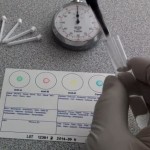Periods might not be the best biological experience for the majority of women, irrespective of how essential it is. There could be many changes that might be experienced before, after or during the menstrual cycle. One of them is a brown discharge that could be seen after periods and is a sign of variation in vaginal secretions, changes in color, consistency and thickness. Usually it is not a matter of grave concern but in serious cases it could be accompanied by other symptoms such as vaginal burning, irritation, dryness, pain and itching. That is why it is recommended to maintain a track of the menstrual cycle to determine the complexity of the situation.
CAUSES:
Although it’s a normal thing to happen in period, there can be variation in the color i.e. light or dark brown and could vary from one woman to another. Even a healthy woman can experience the same not only after but also before or during the cycle. Although the causes cannot be generalized but in most cases they could be as follows:
1. Hormonal imbalance:
This is one of the most common causes. If someone has started or stopped taking birth control pills then it might also lead to changes in the hormones in the body. But continuous spotting should not be ignored as it could be a signal of something serious that needs medical attention. Changes in diet, smoking and alcohol consumption also contribute to an extent.
2. Irregular periods:
Many times irregular periods could cause brown spotting after menstruation. This is also a result of tearing of the endometrial tissue that is a lining for the uterus. But this tearing is nothing to worry about as it is a part of the cleaning process of the previous unclean blood as well as the tissue. Unless the discharge is more than usual there is no need for medical help.
3. Implantation Bleeding:
Even after almost a few weeks of last periods there could be brown spotting due to unsafe sex or changes in birth control which could signify early pregnancy. Often, women take this kind of light spotting casually but it is more important to understand its mechanism to avoid any complication.
4. Yeast Infection:
The discharge or spotting could come as a result of yeast infection or could get worse if one is already affected by it. Such a condition is accompanied by pain and irritation and sometimes burning sensations and itching with the usual brown spots. Also the color and smell could vary and get more prominent as a sign of infection. The foul smell is a serious indicator where one must seek medical advice.
5. Pelvic Inflammatory Disease:
This is a kind of infection that affects the uterus as well as the ovaries and in some cases even the fallopian tubes. It can develop due to sexually transmitted diseases and its symptoms include spotting, pain in the abdomen, painful intercourse, and foul smell in the discharge.
6. Cervical Cancer:
If the spotting persists for more than three menstrual cycles accompanied by painful sexual intercourse and heavy bleeding then one must get it checked since this kind of unusual secretion can be a cause and effect of unchecked cervical or uterine cancer.
7. Damaged Internal/Reproductive Part:
In complicated cases a usual brown discharge could also be altered blood as a symptom of a damaged internal or reproductive part that will need detailed attention. It can occur due to an injury as well.
8. Menopause:
Menstrual cycle has more than one phase such as menopause, early menopause or post menopause might lead to vaginal spotting post the periods. However in most of the cases it takes place in early menopause stage. If the bleeding is normal and there are no cramps then one can be relaxed about it.
9. Stress:
Stress and anxiety can interfere with the regular menstrual cycle as well as the fertility. There could be irregularity in the periods as well as unusual spotting accompanied by cramps.
Treatment
It is important not to ignore the unusual signs and changes in the menstrual bleeding and cycle. As already discussed, the causes could be different for different women but the changes could be generalized and should be resolved if complications arise. Most of the time medications do the needful but lifestyle changes are equally important. But the most important part is the timely diagnosis and treatment to avoid further complications.

Hi, I am 21 years old. My period date was supposed to be on 1st of every month. I missed my period and instead getting brown discharge from vagina. I haven’t had any sort of intercourse. What can be the cause for this?